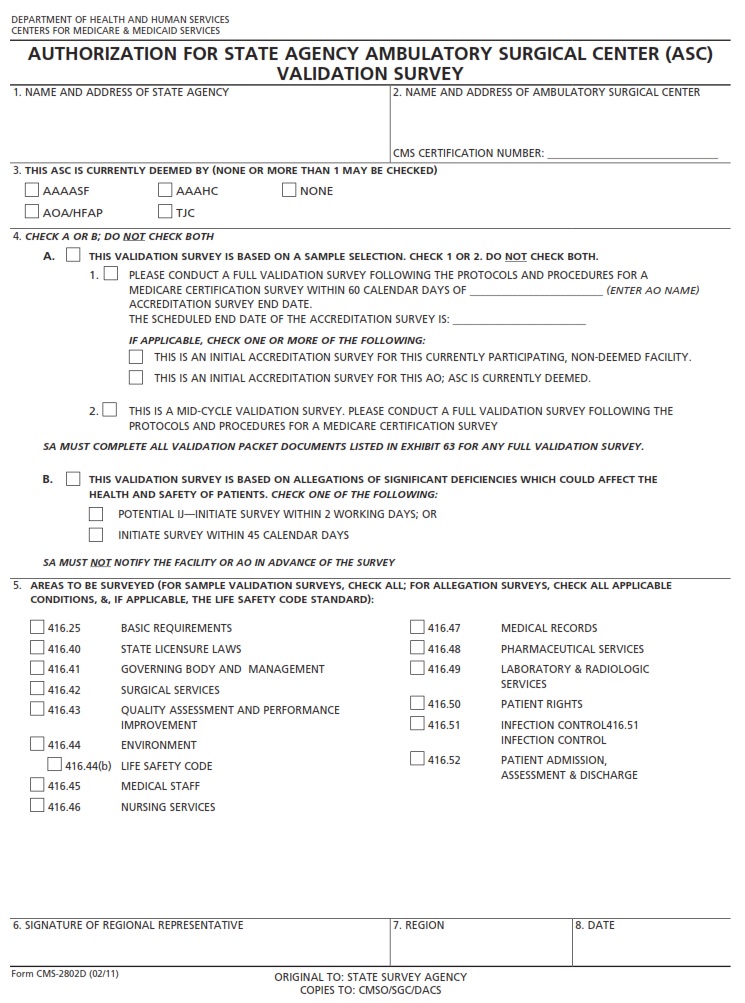CMSFORM.ORG – CMS 2802D – REQUEST FOR VALIDATION OF ACCREDITATION SURVEY FOR AMBULATORY SURGICAL CENTER – In the fast-paced world of healthcare, ensuring the highest standards of care and safety in ambulatory surgical centers is paramount. The CMS 2802D – Request for Validation of Accreditation Survey for Ambulatory Surgical Center plays a crucial role in upholding these standards by evaluating and validating the accreditation surveys conducted on these facilities. Imagine a behind-the-scenes look at the intricate process that determines whether an ambulatory surgical center meets the rigorous requirements set forth by accrediting bodies. This article delves into the nuances of this validation process, shedding light on its importance in maintaining quality care and patient safety within ambulatory surgical centers. Join us on a journey through the complexities of healthcare accreditation as we uncover how CMS 2802D serves as a vital checkpoint in ensuring excellence in ambulatory surgical services.
Download CMS 2802D – REQUEST FOR VALIDATION OF ACCREDITATION SURVEY FOR AMBULATORY SURGICAL CENTER
| Form Number | CMS 2802D |
| Form Title | REQUEST FOR VALIDATION OF ACCREDITATION SURVEY FOR AMBULATORY SURGICAL CENTER |
| Published | 2011-02-01 |
| O.M.B. | |
| File Size | 97 KB |
What is a CMS 2802D?
The CMS 2802D, also known as the Request for Validation of Accreditation Survey for Ambulatory Surgical Center, is a crucial document in the healthcare industry. It serves as a means for ambulatory surgical centers to demonstrate their compliance with accreditation and regulatory requirements set forth by the Centers for Medicare & Medicaid Services (CMS). This form plays a vital role in ensuring that these facilities maintain high standards of patient care, safety, and quality.
Through the CMS 2802D process, ambulatory surgical centers undergo rigorous validation surveys conducted by accredited organizations to assess their adherence to guidelines and regulations. These surveys help identify areas for improvement and ensure that facilities are providing safe and effective care to patients. By completing this form accurately and thoroughly, ambulatory surgical centers can showcase their commitment to maintaining excellence in healthcare delivery and upholding industry standards.
Where Can I Find a CMS 2802D?
When searching for a CMS 2802D form, your first stop should be the official website of the Centers for Medicare & Medicaid Services (CMS). Here, you can find a downloadable version of the form along with detailed instructions on how to complete it accurately. Additionally, many third-party medical supply websites may also offer the CMS 2802D form for purchase or download, providing a convenient alternative for those in need.
For a more personalized approach, reaching out to your local healthcare accreditation agency or ambulatory surgical center association could prove fruitful in obtaining the CMS 2802D form. These organizations often have resources available to assist facilities in accessing and completing necessary accreditation surveys like the CMS 2802D. By leveraging these resources and networks, you can streamline the process and ensure compliance with regulatory requirements in no time.
CMS 2802D – REQUEST FOR VALIDATION OF ACCREDITATION SURVEY FOR AMBULATORY SURGICAL CENTER
The CMS 2802D request for validation of accreditation survey for ambulatory surgical centers signifies a crucial step in ensuring quality care and patient safety within these facilities. This validation process plays a vital role in verifying that the ambulatory surgical centers adhere to the required standards and guidelines set by accrediting bodies. It serves as a mechanism for continuous improvement and accountability, ultimately enhancing the overall quality of healthcare services provided.
By undergoing this validation process, ambulatory surgical centers demonstrate their commitment to maintaining high standards of care and upholding patient safety protocols. The insights gained from the validation survey not only benefit the facility but also help inform best practices across the industry. It fosters a culture of transparency, accountability, and ongoing quality improvement that resonates throughout the healthcare ecosystem, ultimately leading to better outcomes for patients undergoing surgical procedures at these facilities.
